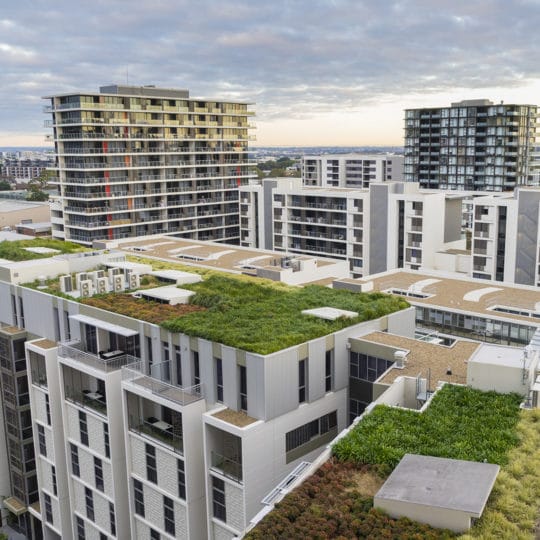Lightweight Growing Solutions for Your Roof Garden
No backyard, No Problem. Learn How Perlite Can Help

What if you want to put your green thumb to use but your yard isn’t suitable for gardening or you live in an urban area and don’t have any land at all? The surprising solution is to look up and use your roof as a gardening space. Two popular options include using a green roof system or roof garden. Today, we’re going to take a look at the difference between the two, the concerns of each, and why perlite is a useful resource for roof gardens.
Green Roof Systems versus Roof Gardens
When you are planning your garden on your roof, it’s important to not confuse two methods: green roof gardens and green roof systems. Both allow for gardening on your roof, but they are very different and require different planning.
Green Roof System
A green roof system is an entire roofing construction plan that can support gardening. It’s a popular choice for businesses. People commonly use this space for very hardy plants that can withstand heat, droughts, and freezing temperatures. Sedums are popular choices because of their resilience.
While beautiful from afar, green roof systems provide other benefits, too. They might be used to protect the roof membrane from harmful UV rays, stormwater management, sound control, and temperature stabilization. It might include a roof garden in certain areas if there is access.
While there are many benefits to a green roof system, there are challenges to overcome as well. Some include:
- An extensive roofing system is required.
- It’s hard to add a green roof system after construction.
- Only hardy plants can be used because the space is difficult to care for.
- You might need to hire a professional to care for the plants periodically.
Roof Garden
Roof gardens are created most often for apartment buildings, recreation centers, and schools in urban areas. A flat roof with access to the top can be treated as a second backyard. People might have patio furniture, grills, and gardens—really just about anything that can be added in a personal backyard. Garden beds are a popular addition to these livable roof systems. Because the plants can get plenty of attention, you might find fruits, vegetables, herbs, and other sensitive plants in addition to more hardy plants.
Roof gardens provide a great opportunity to enjoy some of the perks of rural and suburban lifestyle without leaving the city. It is a rewarding opportunity for all members of the community to learn about gardening and grow their own fresh food. Even some culinary businesses get involved and grow their own produce on the roof.
Roof Garden Concerns
- Weight is one of the biggest concerns for this rooftop paradise that can support a garden. Soil is incredibly heavy, and the roof must be able to support that weight consistently—plus be ready to take on the additional weight after heavy rain and plant growth.
- How can you ensure proper drainage off the side of the building after heavy rain or overwatering?
- Your roof doesn’t have to be designed around it, but you will need professional help installing a member to keep your roof safe.
Perlite for Your Roof Garden
Perlite is formed by molten (magmatic) rock, also known as volcanic glass. Over time, and during formation and cooling, water is absorbed into the raw perlite ore matrix. When perlite ore is heated rapidly in industrial furnaces, the volcanic glass softens, causing the entrapped water molecules to turn to steam and expand the perlite particles—much like popcorn. This can increase in volume up to 20 times its original size. These expanded perlite particles are lightweight and insulated glass bubbles that can hold water and air.
Advantages of perlite for your roof garden
- It’s lightweight. Fully watered soil weighs 100 to 125 pounds per cubic foot. Horticultural perlite and peat moss only weigh 40 pounds per cubic foot. Perlite reduces the planter weight by at least 60%!
- Perlite will not deteriorate over time.
- It retains water and plant food up to four times its weight without becoming soggy. This allows the nutrient and air-holding capacity of your planting mix.
- It has a neutral pH and won’t change the alkalinity or acidity of your mix.
- It’s sterile and won’t support disease, insects, and other soil-borne pests.
- Because of its lightweight, it’s easier to handle than soil. Plus, it even reduces shipping costs.
- It’s clean odorless, and safe to handle.
To learn even more about using perlite for your roof garden, read the Roof Gardens that Are Gentle on the Roof guide. You can also learn about the real application for a Chicago store in Gardens in the Sky.
Request Your Free Sample of Perlite
Dicalite Management Group is an international industrial minerals company with a unique multi-mineral platform including perlite, vermiculite, and diatomaceous earth, represented across three brands: Dicalite Minerals, Dicaperl Minerals, and Specialty Vermiculite. Our sales and technical services team work closely together to ensure you are getting the right product for your application. We know you’ll love the results of using perlite in your roof garden, so we’d like to send you a free sample. Call us today at 866-728-3303 to request your sample and speak with a knowledgable representative.
We encourage you to explore our Product Finder. You can narrow down your choices by mineral and find your perfect soil substrate.
Join Our Mailing List
Our blog offers insight and information about new and exciting uses for perlite, diatomaceous earth, and vermiculite deriving from years of research and application. From passive fire resistance to mineral depth filtration, by subscribing to our mailing list, you will receive the latest information surrounding the Dicalite, Dicaperl, and Specialty Vermiculite brands and products.